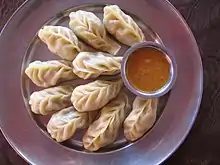momo
See also: Appendix:Variations of "momo"
English
Pronunciation
- IPA(key): /ˈməʊməʊ/, enPR: mō'mō
Noun
- A type of dumpling from Nepal, Ladakh or Tibet made with a simple flour and water dough and filled with meat, vegetables or cheese.
- 2022 January 25, Christina Morales, “How the Air Fryer Crisped Its Way Into America’s Heart”, in The New York Times, →ISSN:
- She heated handpies and tofu in her off-campus apartment, and at her home in India, she heats momos, dehydrates mangoes and cooks whole, shelled peanuts.
- (India, slang, offensive) A person from Northeast India.
- 2017 May 23, Alana Golmei, “Let’s talk about racism”, in Hindustan Times, Delhi:
- Since I come from the North-eastern part of India myself and belong to a minority race, I too have suffered from racism, at least in its milder forms. I’ve been called "chinky", "momo", "chowmein", and more.
- 2021 June 9, “Northeast Indians DISRESPECTED once again with 'momo' slur”, in India Today Northeast:
- Now, it is a well-known fact that many Northeast Indians are derogatorily called 'momos' after the dish by mainland Indians for their round-ish features.
Alternative forms
Translations
type of dumpling
|
Etymology 2
Clipping and reduplication of moron.
Noun
momo (plural momos)
- (US, slang, derogatory) A moron.
- 1995, Nicholas Pileggi, Martin Scorsese, Casino, spoken by Ace (Robert De Niro):
- The probability on one-four-reel machine is a million and a half to one. On three machines in a row, it's in the billions. It cannot happen… would not happen, you fuckin' momo!
Further reading
 Momo (food) on Wikipedia.Wikipedia
Momo (food) on Wikipedia.Wikipedia - Jonathon Green (2024) “momo n.”, in Green’s Dictionary of Slang
- Eric Partridge (2005) “momo”, in Tom Dalzell and Terry Victor, editors, The New Partridge Dictionary of Slang and Unconventional English, volumes 2 (J–Z), London, New York, N.Y.: Routledge, →ISBN, page 1310.
Adangme
Aiwoo
See also
References
- Ross, M. & Næss, Å. (2007) “An Oceanic origin for Äiwoo, the language of the Reef Islands?”, in Oceanic Linguistics, volume 46, number 2. Cited in: "Äiwoo" in Greenhill, S.J., Blust, R., & Gray, R.D. (2008). The Austronesian Basic Vocabulary Database: From Bioinformatics to Lexomics. Evolutionary Bioinformatics, 4:271–283.
Hopi
Etymology
(This etymology is missing or incomplete. Please add to it, or discuss it at the Etymology scriptorium.)
References
- Albert, Roy, Shaul, David Leedom (1985) A Concise Hopi and English Lexicon, John Benjamins Publishing Company, page 40
- Hopi Dictionary Project, The (1998) Hopi Dictionary: Hopìikwa Lavàytutuveni: A Hopi Dictionary of the Third Mesa Dialect with an English-Hopi Finder List and a Sketch of Hopi Grammar, Tucson: The University of Arizona Press, page 244
Kholosi
Maori
Further reading
Portuguese
Spanish
Etymology
Uncertain:
- from Vulgar Latin *mōmus, from Ancient Greek Μῶμος (Mômos, “god of satire and mockery”), from μῶμος (mômos);
- from an imitative Proto-Germanic root, whence Dutch mom (“mask”), German Mumme (“mask”) - see mummer.
- from Old French momer (“to wear a mask”), related to momon (“mask”), from an child's word expressing astonishment. Compare English mum.[1]
Cognate to Portuguese momo, Aragonese momo, Catalan mom, French momon (“mask”).
Pronunciation
- IPA(key): /ˈmomo/ [ˈmo.mo]
- Rhymes: -omo
- Syllabification: mo‧mo
References
- Roberts, Edward A. (2014) A Comprehensive Etymological Dictionary of the Spanish Language with Families of Words based on Indo-European Roots, Xlibris Corporation, →ISBN
Further reading
- “momo”, in Diccionario de la lengua española, Vigésima tercera edición, Real Academia Española, 2014
Tagalog
Etymology
From apparent reduplication of the first syllable of multo.
This article is issued from Wiktionary. The text is licensed under Creative Commons - Attribution - Sharealike. Additional terms may apply for the media files.
